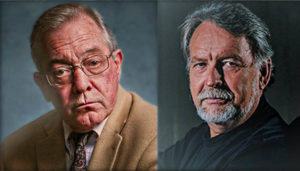Police Training - Interviewing Techniques
Blue Steel training sessions are concise and easy to understand. Each session lasts 7-10 minutes and the training is delivered by noted interviewing experts Steve Bowers and Jim Leach.
Sending and Receiving Messages: Did you hear what his body said? We discuss the impact of your total demeanor when you are sending messages (communicating) with other people.
How well do you send and receive messages when you are trying to communicate with others? Discover how your total demeanor impacts the effectiveness of your communication skills!
Good Listening - Listen, Louder! This session gives you tips on being a better listener and recognizing evidence of stress exhibited by the other person. Our experts also discuss avoiding distractions and interruptions
Being a GREAT LISTENER is essential to being a GREAT INTERVIEWER. Get tips from a couple of the best interviewers in the country!
Determining a Baseline - Does she normally act this way: Discovering what a person’s baseline behavior determines how well we can tell if they are being truthful or they are feeling stress for some reason. The experts describe how to properly read a person’s baseline behavior
One of the first things a good interviewer tries to do is develop a BASELINE on the person being interviewed. In other words, how does the other person look, act, and sound when they are just “being themself” ? Changes in a person’s behavior can indicate deceit, fear, happiness, or any of many emotions. The trick is to be able to IDENTIFY the changes. Let our expert interviewers help you!
Empathy - OK, I GET IT! This session details exactly what utilizing an empathetic approach means and why it can be valuable to an interviewer. Leach and Bowers also discuss various ways to express empathy.
If you are interviewing someone, or just talking to them, you want them to “talk back” to you. One of the best ways to to get someone to open up to you is to make them feel as though you “UNDERSTAND” what the are saying, feeling, or experiencing. This is known as being “empathetic” and can be one of the most important communication skills you can develop. Let Steve Bowers and Jimmie Leach share their expertise with you in this valuable lesson.
Using Stress - When the HEAT is on! This session covers the effects stress may have on body language. Bowers and Leach also discuss that creates a stressful interview and the importance of distinguishing between normal stress that may be present when speaking with an authority
Applying a little stress during an interview can make for a much more truthful conversation. Learn how to legally and effectively utilize stress when conducting an interview!
Developing a Theme How am I supposed to talk to this guy?? This discussion deals with the importance of having something to talk about different factors to consider when developing the best theme for an interview. What to do if the theme you chose isn’t working!
Even though a good interviewer must be ready to change plans if what they are doing or saying is not working, preparing for the interview is essential. Part of your preparation is to develop a “theme” you believe will result in a productive interview. Let the professionals tell you ho to do it!
Really…Is that right? The sessions begins by emphasizing importance of qualifying victims and witnesses in order to make sure you are getting accurate information. “Leading” witnesses or allowing victims or witnesses to be “more helpful” than they are capable of being can contaminate your entire investigation. We also discuss how to get better descriptions.
Suspects are not the only folks that may try to deceive you! A victim or witness that may not be totally truthful can be devastating to an investigation. Take advantage of decades of experience to help keep this from happening to YOU!
Suspects and Confessions - Make it easy for them to tell it! Steve and Jim discuss what makes people confess to wrongdoing and the importance of accepting a suspect’s reasoning as to why they participated in such behavior.
This video is a frank discussion about why people may confess to wrongdoing and how you might be able to help them see the advantages of being truthful!

